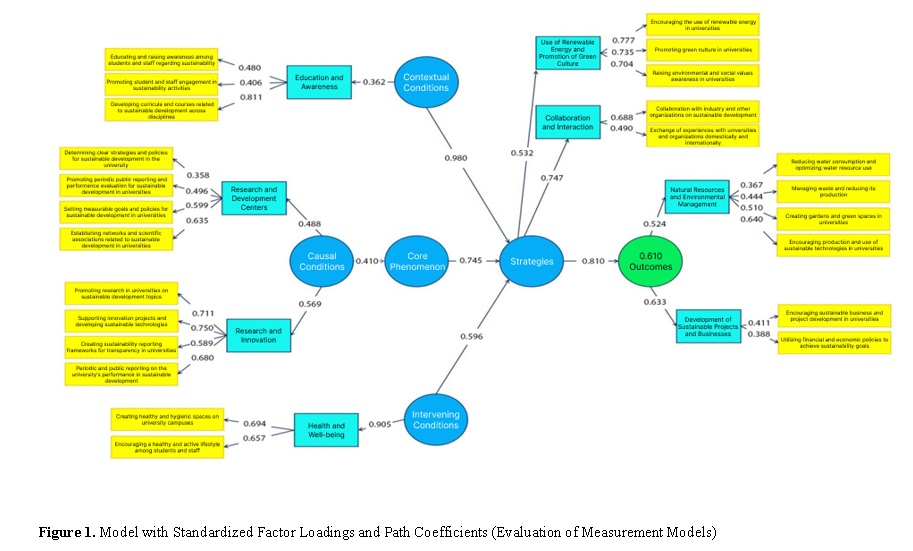Structural Modeling of Higher Education Based on Sustainable Development Components Using a Mixed Method (Case Study: South Pars Region)
Keywords:
Higher Education, Sustainable Development, South Pars, Grounded Theory, ModelingAbstract
The aim of this study is to structurally model higher education based on sustainable development components using a mixed-method approach. This applied research employs a mixed-method (qualitative-quantitative) design. The statistical population includes 12 specialists and academic experts in the field of sustainable development in general, and sustainable development in higher education in particular. In the qualitative section, their opinions were used to identify and code the categories. For the modeling process, the statistical population consisted of faculty members, postgraduate students from the Persian Gulf University, and specialists from the South Pars Special Economic Zone, including experts in environmental sciences, economics, social sciences, and faculty members and postgraduate students from Persian Gulf University. The sample size was calculated using Cochran’s formula for unknown populations, resulting in a sample size of 384 individuals, with a random accessible sampling method. To identify the factors, interviews were conducted, and through open, selective, and axial coding, categories and concepts were extracted. The results of this phase yielded 451 open codes, 24 axial codes, and 8 selective codes. Subsequently, in the next phase, the Delphi technique was used to filter the central, causal, contextual, intervening, strategic, and outcome conditions through three rounds of screening. Ultimately, consensus was reached on 135 open codes. For the modeling process, structural equation modeling and partial least squares (PLS) software were used. The results of the study revealed that the structural modeling of higher education based on sustainable development components, using the mixed method, includes 2 causal conditions and 8 subcriteria, 1 contextual condition and 3 subcriteria, 1 intervening factor and 2 subcriteria, 2 strategies and 5 subcriteria, and finally, 2 major outcomes with 5 subcriteria. These outcomes, ranked by priority, are the development of sustainable projects and businesses (with a factor loading of 0.633) and the management of natural resources and the environment (with a factor loading of 0.524). Consequently, it can be concluded that focusing on sustainable development in the region enhances business development and the conservation and management of natural resources.
References
A. Ghorbani Sheikh Nashin and S. Haddad Zand, "A Comparative Study of Clean Energy Policy in Sustainable Development of China and the USA," Iranian Journal of International Politics, vol. 12, no. 2, pp. 437-464, 2024.
M. García-Feijoo, A. Eizaguirre, and A. Rica-Aspiunza, "Systematic review of sustainable-development-goal deployment in business schools," Sustainability, vol. 12, no. 1, p. 440, 2020, doi: 10.3390/su12010440.
H. Mazal Alak, Y. Mohammadzadeh, and S. Hekmati Farid, "Investigating the Impact of Logistics Performance on Sustainable Development in Emerging Countries: A Spatial Approach," Applied Economic Theories Quarterly, vol. 11, no. 1, pp. 97-134, 2024.
T. Suaco, "The Integration of Sustainable Development Goals in the Secondary Science Curriculum of Cordillera Administrative Region," Diversitas Journal, vol. 9, no. 1_Special, 2024, doi: 10.48017/dj.v9ispecial1.2835.
M. Chiang and P. Chen, "Education for sustainable development in the business programme to develop international Chinese college students' sustainability in Thailand," Journal of Cleaner Production, vol. 374, p. 134045, 2022, doi: 10.1016/j.jclepro.2022.134045.
S. Chen, M. Lu, H. Tan, X. Luo, and J. Ge, "Assessing sustainability on Chinese university campuses: Development of a campus sustainability evaluation system and its application with a case study," Journal of Building Engineering, vol. 24, p. 100747, 2019, doi: 10.1016/j.jobe.2019.100747.
W. Leal Filho, A. L. Salvia, and J. H. P. P. Eustachio, "An overview of the engagement of higher education institutions in the implementation of the UN sustainable development goals," Journal of Cleaner Production, vol. 135694, 2022, doi: 10.1016/j.jclepro.2022.135694.
J. M. Lopes, N. Suchek, and S. Gomes, "The antecedents of sustainability-oriented entrepreneurial intentions: An exploratory study of Angolan higher education students," Journal of Cleaner Production, vol. 136236, 2023, doi: 10.1016/j.jclepro.2023.136236.
A. Ashida, The Role of Higher Education in Achieving the Sustainable Development Goals Sustainable Development Disciplines for Humanity. Springer, Singapore, 2023.
S. Karimi, "Reconsidering Educational Skills for Sustainable Development in the Content and Methods of Higher Education in Handicrafts," Journal of Craft Arts Pathways, vol. 1, no. 2, pp. 1-15, 2021.
F. Arab, F. Zamani, and T. Enayati, "The Impact of Land Use Planning with a Focus on Health Higher Education on Sustainable Development and Educational Justice in Medical Science Universities of the First Meta-Region," Iranian Journal of Medical Education, vol. 21, no. 84, pp. 1-12, 2021.
A. Mahdavi, "Investigating the Efficiency of Higher Education in Iran in Achieving Sustainable Development," Journal of Economic Research (Growth and Sustainable Development), vol. 20, no. 4, pp. 1-32, 2020.
Y. Mohammadi, F. Manavifard, Salehi, and R. Mohammadi, "Factors Influencing the Development of Sustainable Higher Education from the Perspective of Students at the Agriculture Faculty of Bu-Ali Sina University," Agricultural Education Management Research, vol. 48, pp. 57-74, 2019.
R. Kolaei Darabi and M. Taghvaei Yazdi, "Presenting a Model of Educational and Research Dimensions of Growth Centers and Its Impact on the Sustainable Development of Universities," Educational Planning Studies, vol. 7, no. 14, pp. 146-171, 2018.
A. Mirsanjari, "Current Status of Public Universities in Tehran Based on Factors Influencing Sustainable University Development," Higher Education Quarterly, vol. 3, no. 2, pp. 139-165, 2018.
A. K. Holfelder, "Towards a sustainable future with education?," Sustainability Science, vol. 14, no. 4, pp. 943-952, 2019, doi: 10.1007/s11625-019-00682-z.
UNESCO, Education for Sustainable Development: A Roadmap. 2020.
P. Priyadarshini and P. C. Abhilash, "Rethinking of higher education institutions as complex adaptive systems for enabling sustainability governance," Journal of Cleaner Production, vol. 359, p. 132083, 2022, doi: 10.1016/j.jclepro.2022.132083.












